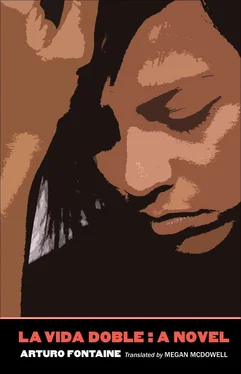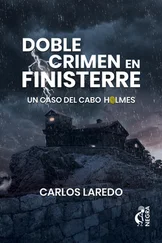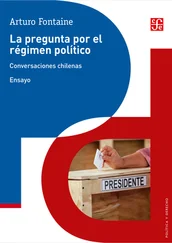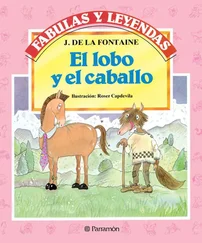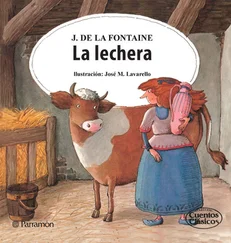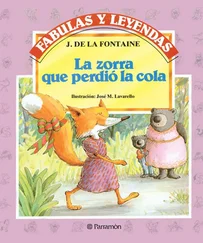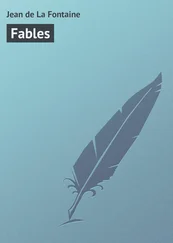Ha, ha! Why am I laughing? You were saying you wanted my version. Don’t ask me to give you yours, then. You have to listen to my story. That’s why you came to Ersta. No one made you come here. You know what? I can smell your contempt, your virtuous-souled contempt.
Remember, when Dante reaches the bottom of Hell he finds the Devil crying. But he’s still the Devil, and he doesn’t repent. If he did, he would be in Purgatory, and he would have hope. The Devil doesn’t repent and yet he cries, he cries hopelessly. There’s something undignified about repentance and the desire for forgiveness, something Christianoid that bothers me. The Devil, even in defeat, stays faithful to himself and to his own contradiction. He punishes those he inspired and who have followed in his footsteps, he punishes them day and night, as he himself is punished. He is the supreme traitor.
Hate is human. There is nothing I don’t hate. Tomasa hates only the other side. Not our brothers, not the ones who placed the bomb and blew up the bridge, not the ones she hid and who later fled, she tells me, leaving her at the mercy of these rabid dogs. I don’t know what cell she’s in. We try to maintain our compartmentalization. But I do know that they’ve brought her face to face with Chico Escobar and with Vladimir Briceño. There must be microphones in here, because she whispers it in my ear. “They want to know about the cash,” she says.
I passed Briceño in the hallway. I’m sure they did that intentionally. His nose was broken, his shirt soaked in blood. We did as we’d been taught: we looked at each other like strangers. It isn’t easy. How do two strangers look at each other in a place like that? Your surprise can betray you — the unexpected pleasure of recognizing a friend, though he’s in the same situation as you — and so can an overly studied indifference. . They’re very alert to any signs.
“If they would just let me work,” Tomasa says to me. “If they would just let me use my body for something. If only I could be a whore, I could do something and I’d at least be that, a whore. I want to prostitute myself,” she says. You won’t be able to understand that feeling. Even I can’t understand it now, but I did back then. Who could I have been in those days?
If only they would let me shower. That’s all I ask. As the days pass you can’t imagine how important that becomes to me. I can’t stand my own smell. Let me change these stinking clothes. Who knows how many people used them before me. They keep us in this basement in these gray, foul-smelling sweat suits and underneath them, nothing. I just want to wear underpants; I want to put on a bra, that’s what I want. Clothes never used to interest me. But now. . If they would only let me go out in the yard for a little while to feel the warmth of the sun on my face.
They’ve said to Tomasa: “Show us your tits, fucking cunt!” And she has lifted her shirt and done as they said. “Your nipples are really long,” they told her. “Your nipples are skinny and ugly,” they told her. And that time they didn’t rape her. Me, I have pretty nipples. Tomasa screamed and they made me listen. She started to screech the moment they tied her up. I try to get used to it. It’s impossible. She shouts like a wild boar. According to her, it protected her; according to her, it satisfied them and they weren’t as hard on her. I’ve told her how I feel about underwear, what I would give for a Triumph bra. She doesn’t care at all about that. As long as they don’t rape her again, she doesn’t care about anything. I want a bra. I feel so skinny. . Who could buy me a bra? It doesn’t matter if they have sex with you, Tomasa tells me, what matters is that they don’t damage your insides. Gato rewards Rat or Ronco, she tells me, he gives them the go-ahead when he feels like it. Tomasa lent me a little mirror the other day. Somehow she gets her hands on those kinds of things. I saw the circles under my eyes, my sunken face, my elongated ears poking out from my greasy hair. My ears never used to stick out like that. But they do now. My breasts are smaller and more flaccid. Or am I imagining that? Surely that’s why I don’t interest them; they don’t even want me to show them. I can feel their nondesire. I’ve heard that some women are forced to dance and they end up naked as showgirls, dancing and crying, naked as effigies of showgirls. In spite of everything, Tomasa and I laugh. I don’t remember about what. But there are things we whisper about that make us burst out laughing.
I concentrate on trying to figure out what time it is, on following the sun between the bars of our cell’s little window and measuring the shadows on the damp walls. The task keeps me busy. Tomasa got her hands on a deck of cards. That keeps us busy. She knows some tricks that amaze me. Tomasa tells me she imagines things, tells herself stories, dreams that she’s free, that she’s at her mother and father’s house, that she’s at a barbecue with high school girlfriends, that she’s climbed up to place a charge on a high-voltage tower, or the column of a bridge; she dreams she’s shooting at the enemy. That’s how she kills time. I try to do the same, I try to imagine I’m crawling along on knees and elbows, soaked to the skin, in the Nahuelbuta mountain range, or with my heavy pack over my shoulder hiding out in the mountains and covering my tracks, or conducting a Vietnamese maneuver, or stashing an FAL rifle — one of those that donkey-kicks your shoulder when you fire — well-oiled and loaded in a hidden compartment under the floor of a house, or I imagine myself excavating a dugout to sleep in under the snow. I never manage to hold these images in my mind. And then, when they take Tomasa for another interrogation, her outbursts are truly frightening. She’s already told them everything, surely. Why do they keep working on her? And I have to listen to it. And when my turn comes, they repeat their instructions: Raise your hand if you want to talk.
Days that are nights go by, merging into nights that are nights. I’m an animal reduced to basic desires: that they won’t hurl one more blow or insult at me or take away my bowl of soup, the pillow or mattress, or the can that serves as a toilet in our cell. It’s all happened to me. These are light punishments. I was punished for lying: four days with the same can, if I figured the time right. I can hear a bell, and that gives us a way to measure time. I hate to admit it, but it’s the truth. The only thing left of that eviscerated time is the bell of a church that gives opiate to the people. It’s like being locked in a medieval dungeon. Although in my situation now the priests are a help, even so, I repeat, they deal in resignation as consolation. Still and all I wait for those bells without which my dragging time would brush the abyss. It’s an anemic present that evaporates and abandons me. The bells are the only human thing we have left.
Then, suddenly, they led me to a changing room and handed me a zippered plastic bag. There were the clothes I was wearing the day they arrested me. My purse, too, my wallet with the eight thousand seven hundred pesos I had with me that day, and my false ID card — everything except the thirty thousand dollars and the four million plus in Chilean pesos we had taken from the Bash safe in the currency exchange. They gave me a document signed by a military judge I never saw: provisional freedom. They had, they laughed, paid my bail with the money they found in my purse. I got dressed and they set me free at stop number 21 on Gran Avenida. There were no explanations.
They let me go in the afternoon. I did what our manuals taught us to do, to lose any “shadows,” as we called them. “Tails,” as they said in Central. But it’s hard for me to walk in a straight line. The light hurts. The wideness scares me, the open space of the street. My first job is to lose my potential watcher. Useless, I thought. But I had to do it and I did it. I got on and off of two buses in a row, I walked along streets and then retraced my steps, I walked around the Central Station a couple of times, went out, and got on a third bus. I decided they weren’t shadowing me. Finally, about four hours later, I got to my mother’s house. It was a shock. My mother cried, so did the cook — everyone but Anita, who looked at me without understanding. Five years old, she was then.
Читать дальше
